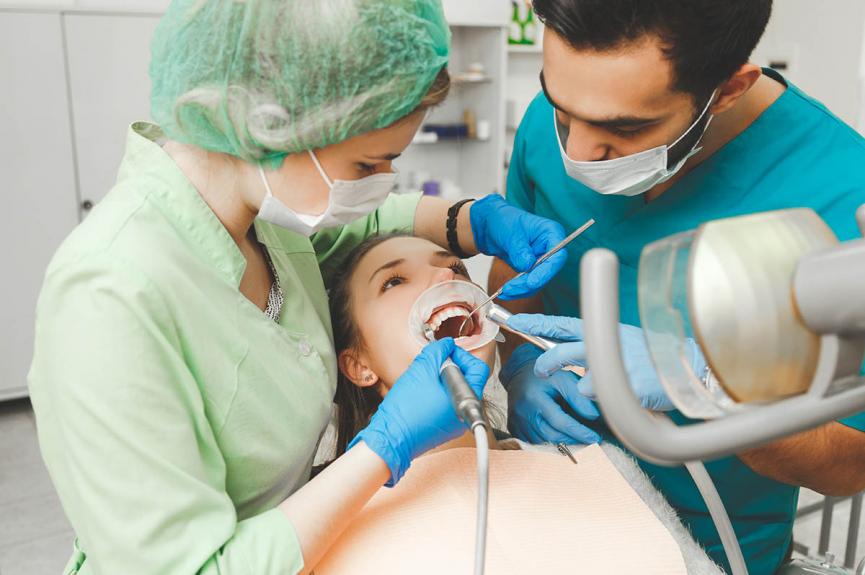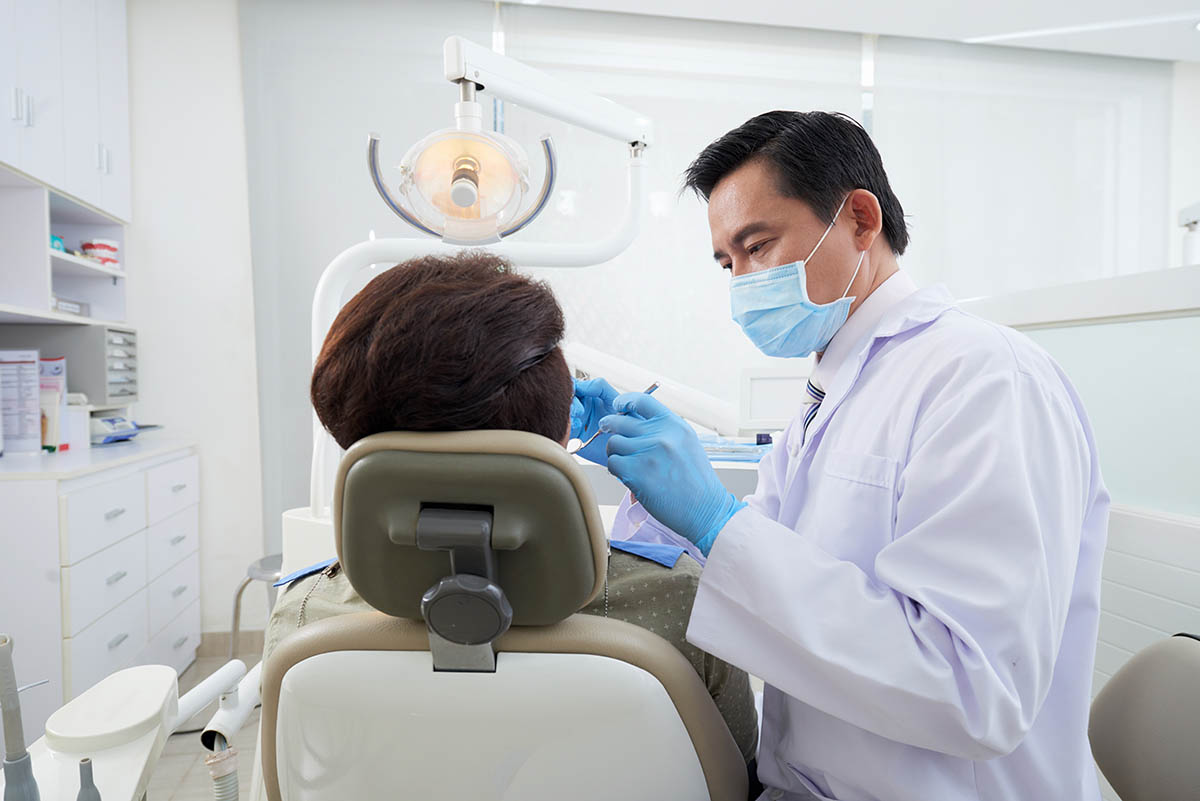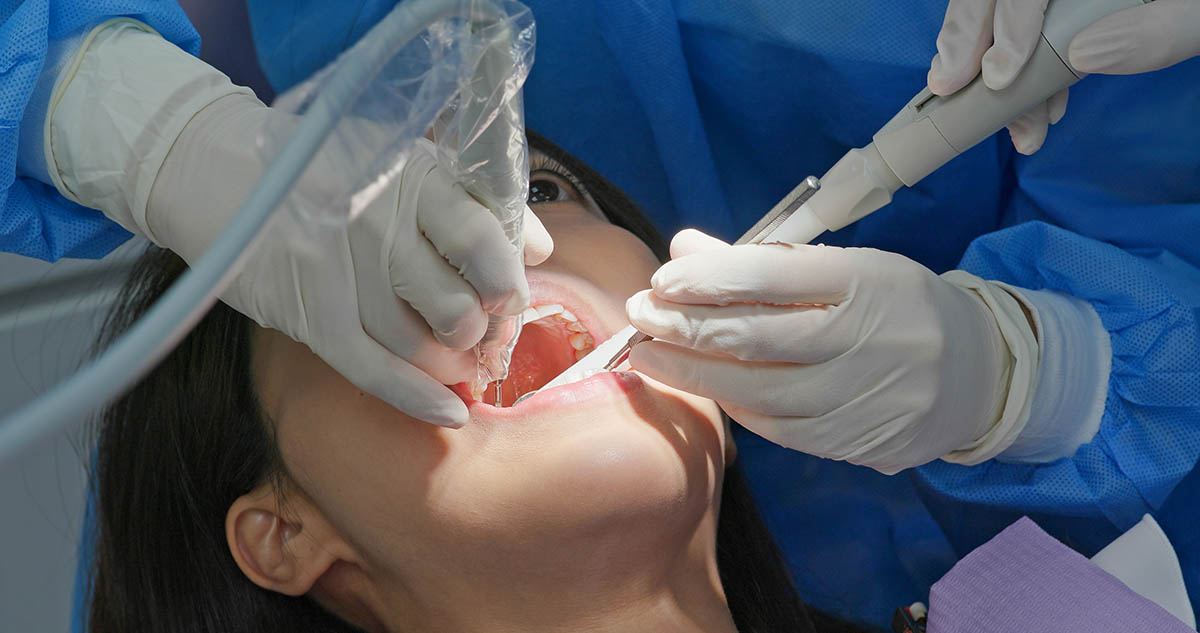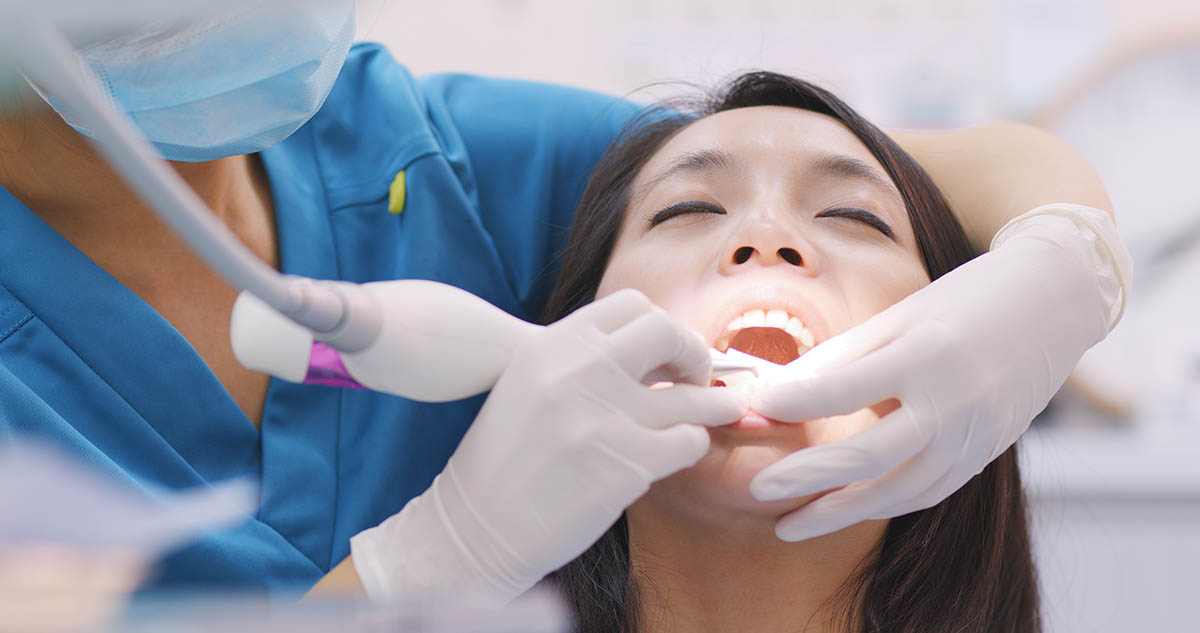
Price/Cost table
| Type | Price/Cost USD |
| Scaling and Polishing | $50 - $100 |
| Scaling and root planing | $170 - $320 |
| Full-mouth gross debridement treatment | $70 - $180 |
| Routine cleaning | $70 - $250 |
Teeth cleaning in the US is a procedure that is commonly performed but rarely understood. A lot of patients are not sure when and why they should ask the dentist for polishing, scaling and other treatments or how they affect dental hygiene. Worry not because this post has you covered. If you stick around, you will learn how to remove tartar from teeth, how much it costs, and what to expect after a deep cleaning of teeth, among other things. We will address every question ever uttered by patients so that you are in the know.
Types of Dental Cleaning in the US
Let us start off with the very basic forms of dental cleaning you may encounter as part of clinic dental services. This will make it easier to understand why you need them.
Prophylaxis cleaning, scaling and polishing
The name gives away the purpose of this procedure. It is employed as a routine maintenance treatment that does away with plaque and tartar between teeth, on gums, and on the tooth surface. This prevents serious issues from developing and keeps the mouth clean and fresh. Even if you practice impeccable oral hygiene, there is still a chance that plaque accumulates in your mouth over time. Your cheeks, teeth, tonsils, palate, tongue, and gums are fraught with bacteria that mingle with food when you eat. While feeding on starches and sugars, they secrete acids that gnaw at the enamel.
When plaque is not removed in due time, it can harden and transform into a substance dubbed tartar, or dental calculus. It has a tendency to attract more and more bacteria, leading to further oral health problems and more severe form of gum diseases (gingivitis 1 and periodontitis). The thing is, tartar is not something you fight by brushing and flossing. It calls for industry-specific equipment and dental care techniques that are available in a dental centre, not at home.
And this is where prophylaxis cleaning comes in handy. It is carried out in dental clinics around the US. By booking occasional deep cleaning services, you erase any plaque and tartar that have made their way to your teeth.
Polishing, scaling and root planing

This procedure is similar to the above one, only it goes a bit further by covering the gum line and inside the gums. It is slightly more invasive and is performed on people with active gum disease like gingivitis and periodontitis. Sometimes it takes several trips to the dentist to get the job done but it’s a sacrifice that you have to make if you want to save your teeth.
Gross debridement services
When a patient has not seen any dentists in years, tartar, plaque and stubborn stains begin to take over, making it difficult, if not impossible, for the dentist to perform adequate oral check-ups. In this case, prophylaxis cleaning is too simple a manipulation to get things going. It takes a more comprehensive method to address the issue. This is why there is gross debridement, a procedure that attempts to clear all gunk between and around the teeth, as well as on the gums.
People who need teeth cleaning services in the form of debridement usually walk in the dental clinic with inflamed gum tissue. In some circumstances, it marks the beginning of a complex treatment that is executed over the course of multiple sessions. Your dentist will run a tool like an electric scaler around the area to break down the tartar, or calculus.
Periodontal cleaning
If you have gum disease, chances are your dentist will schedule you for periodontal maintenance which entails cleaning the entire mouth with specialised equipment. It may be done in chunks over the course of multiple appointments until all symptoms are managed. You need to realise that gum disease can impact your smile and harm your overall health unless you take precautions.
Frequency of Deep Cleaning Sessions in the US
How often you should deep clean your teeth differs per each unique case. Some patients tend to build plaque much more readily than others despite their efforts to maintain good oral hygiene 2. According to dentists, the number of recommended dental cleanings per year for people like them is every 6 months 3. This also happens to be the maximum number of cleanings covered by insurance in most countries.
However, there are people who don’t need to undergo this dental treatment as often. The best thing to do is discuss the frequency of your scaling, polishing, and other clinic dental services with your dentist or hygienist.
Teeth Cleaning, Scaling and Polishing: Price
The dental cleaning cost varies per practice and type of procedure. It may or may not cover additional costs such as medicine, anaesthetic, and consultation fee.
- In the US, dental scaling and polishing range between: $50-$100
- Scaling and root planing deep cleaning teeth cost: $170 - $320
- Gross debridement: $70 - $180
- Consultation fees: ranging from $20 to $40.
- Routine cleaning - $70 - $250
Is the teeth cleaning price covered by insurance at clinics?
In most cases, yes, but you have to verify this through a dental hygienist. More complex services, and especially those that are regarded as cosmetic like Invisalign, are paid by patients themselves. It is always a good idea to clear the details in advance with the dentist you are going to.
Benefits of Deep Cleaning Teeth: Polishing, Scaling, and Gross Debridement

Here are the basic advantages of scaling, polishing, and debridement in the US:
- Deep cleaning does a much better job at cleaning your teeth than any other at-home treatment. Brushing and flossing play a vital part in your oral health but they can only do so much to offset bacteria in plaque.
- Regular scaling and polishing will keep the roots of your teeth safe from dental plaque and bacteria.
- The effects of gum disease can be greatly lowered using this procedure.
- Calculus teeth removal fixes bad breath and makes your smile irresistible.
- Teeth cleaning delays gum disease and tooth loss.
Disadvantages of Deep Cleaning Teeth
Although plaque and tartar removal is generally important, it can have some downsides.
- Scaling, polishing and debridement are no magic cure for gum problems.
- It may require more than one appointment, especially if patients present with lots of calculus on the teeth.
- Although it’s not painful, some people will experience weird sensations during the scaling and polishing procedure. Thus, local anaesthetise might have to be given to the patient to ease them into the treatment.
- Teeth cleaning services might be harmful to immunocompromised people or those with heart problems. Dentists might want to think about prescribing an antibiotic prior to the scaling and polishing procedure to deter bacteria from hopping into the bloodstream and stirring up trouble.
- The results will depend on the general oral healthcare practised by the patient. Unless they take care of their teeth, relying solely on deep cleaning will not do it.
- Scaling and polishing may result in your gums receding.
The cons of dental cleaning, scaling and polishing should not stop you from doing what is best for your teeth. The benefits outweigh the risks and maintenance sessions in the US should be part of your dental care plan.
Is Deep Cleaning Teeth Necessary?
At some point, you may need teeth cleaning service in the US. This depends mostly on your dental hygiene and partially on your susceptibility to dental disease. If you neglect your teeth or delay treatment for too long, your gums may begin to pull away from the teeth, leaving the bone exposed and creating pockets in between. The least you can do is undergo deep cleaning as a way to slow down the process.
Here are some of the signs of poor gum health that will indicate you need to have your teeth cleaned using professional services at certified clinics:
- Persistent bad breath that is not related to digestive disorders
- Bleeding or tender gums
- Swollen gums
- Pain when chewing
- Loose teeth
- Sensitive teeth
- Teeth that appear to be longer than what they normally are
Before putting you on any dental treatment, such as scaling and polishing, your dentist will do a check-up and might wish to order an X-ray to have a better peek at your bones and soft tissues. If you have cavities, polishing, scaling, and cleaning will not fix the problem. Additional procedures will be put in place to address that.
Deep Cleaning of Teeth: Side Effects
Based on how much tartar and plaque you’ve accumulated, the scaling and polishing procedure may be a little rough on your gums. After you exit the dental clinic, you may have tooth sensitivity and swollen gums for a few days but that’s perfectly normal. What is not okay is those issues persisting. If they don’t go away on their own after a week, you should consult your dental hygienist or dentist. Read our article for more in-depth information on possible side effects after teeth cleaning.
Does Deep Cleaning Teeth Hurt?
No, not at all. You may feel some strange sensations during the manipulation but it is doubtful that you experience pain. If this happens, talk to your dentists to see what steps can be implemented to address the problem. Many dental clinics can give you anaesthetic gel on your gums and teeth for your comfort.
Can Teeth fall out after Deep Cleaning, Scaling Polishing and Debridement?
No. The teeth cleaning procedure is not likely to cause tooth loss. What leads to teeth falling out is gum disease which results from bad oral hygiene and improper dental care. If you don’t want to ever part with your teeth, you have to develop healthy habits, employ proper brushing techniques, as well as learn how to remove plaque and tartar professionally. This means using dental services at least once a year to keep everything under control.
Plaque after Wisdom Teeth Removal
If you are one of the ‘lucky’ folks that have wisdom teeth, you know what a challenge it is to manoeuvre the toothbrush around these guys and get all the dirt and germs out. Their position makes it hard to keep dental plaque in control but after extraction of the wisdom tooth, you will be able to clean around it and the issue will resolve itself. Scaling, polishing, and gross debridement will be a breeze to carry out. You should still have this addressed at a certified dental centre near your location.
What to Do if Feeling sick after Dental Cleaning?
Teeth cleaning appointment at a certified dental centre should not make you feel sick. So, if anything like that happens, make sure to call your dentist’s attention right away. If you are dealing with periodontal disease, bacteria from your mouth might sneak into your bloodstream and travel to various parts of your body. This could cause a number of different health problems that extend beyond general dental issues.
So, if you notice anything suspicious, it is best to contact a specialist to rule out an infection. It is probably a good idea to talk to your doctor about taking antibiotics prior to scaling, polishing and debridement to minimise the risk of bacterial infection.
Additionally, there are other reasons to get sick after a dental procedure. While having their teeth cleaned, some patients find out they are allergic to a product employed in the process. Others have disorders like chronic fatigue syndrome, rendering them sensitive to treatments and manipulations of any kind, scaling and polishing included.
All things considered, you should definitely speak up if you are not feeling well following your dental cleaning procedure to ensure it is not something serious. If necessary, go back to the dental clinic for evaluation services.

Foods that Help You Go Longer between Teeth Cleaning Appointments
- Black and green teas are rich in polyphenols that can neutralise or fight off bacteria.
- Milk and dairy products make you produce more saliva. Thanks to the calcium content, they also strengthen the tooth enamel.
- Veggies and fibre-rich foods help wash away food particles. They strengthen your saliva, making it easier to break down enzymes and neutralise acids that eat away at your enamel. Eat more veggies and scaling and polishing can wait.
- Foods and drinks with fluoride like average tap water, fruit juices, dehydrated soups, and cooked oatmeal will add a coat of phosphate and calcium to the teeth, saving them from the acids that bacteria release.
How to Remove Plaque from Teeth at Home
Dental plaque is soft which means it could be brushed off the normal way. If you brush your teeth for 3 minutes, that removes 55% more plaque than you just do it for 30 seconds 4. However, your only chance of preventing the accumulation of bacteria is to wash regularly, floss every day, and use mouth rinse every now and then. Go for fluoride toothpaste and invest in an electric toothbrush. Newer models have proven much more efficient in plaque control than manual devices.
And just to clarify: there is no such thing as deep cleaning teeth at home. Scaling, polishing, periodontal cleaning, and debridement are in-office procedures in the US. The only ritual you are entitled to do at home is brush and floss - a routine that works on the surfaces of teeth and can only deal with soft gunk and dirt. In no way is it capable of flushing tartar away. For that, you need scaling, polishing, or deep cleaning.
Are there home remedies to remove plaque from teeth? Absolutely. In fact, you should be proactively trying to keep bad bacteria and plaque under control to avoid tooth decay, cavities, serious issues, and permanent damage. This will help you stay away from the dental centre.
Here are some tips to abide by to avoid plaque and keep your teeth clean:
- Stop smoking
- Create good oral hygiene habits
- Rinse your mouth with mouthwash regularly (dentists in the US recommend different products)
- Use toothpaste with fluoride and improve your brushing technique, especially around wisdom tooth areas (this will keep cavities to a minimum as well)
- Rinse with baking soda
- Rinse with coconut oil
Monitoring your general and oral health will save you trips to various dental clinics in the US but it won't eliminate the need for prophylaxis appointments. So, having your teeth cleaned is still on the agenda.
How to Pick a Polish and Scaling Specialist

If you’ve recently moved to a new area, it may be a bit stressful to realise you have to seek a dental clinic. Your best bet would be to ask your current dentist for recommendations. Also, check with your co-workers, family, and friends for more options. One of them probably has a good dentist in mind.
Another way to go is to look for online customer reviews. But before you type in the words ‘dental scale and polish near me’ on your preferred search engine, you ought to know the treatment is done routinely and can be administered by a dental hygienist at any dental clinic.
Considering you want the best dental care for your dental health, you should do your due research and go to a certified practice. Crucial aspects to take into account are previous experience, impeccable hygiene, and good manners. If the procedure is more complex - say you want to do periodontal cleaning or gross debridement every 6 months - you should be more vigorous in your search. The same logic applies when you have to treat cavities and general dental issues. Scheduling the right clinic services with the right specialists will make all the difference.
There are plentiful dental clinics in the country and chances are you will come across a medical establishment for teeth washing that is good for you. You can use the search button on our site to find a relevant fit in all areas you wish to dig into. And just so you know, you can also check customer reviews left by a number of people. This will kick-start your experience with clinics.







